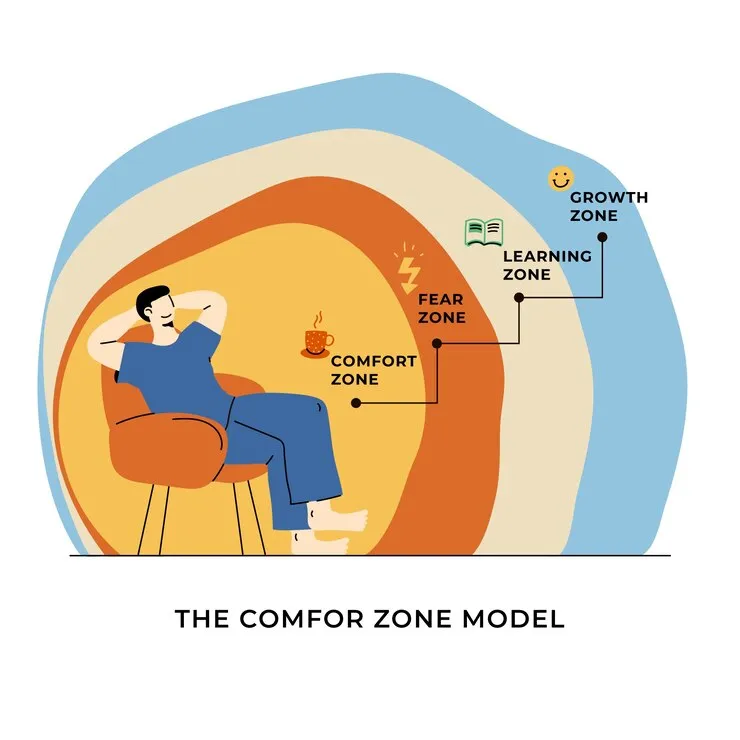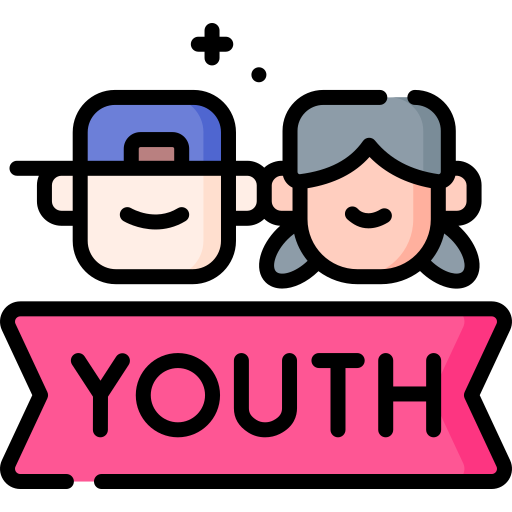What is a Comfort Zone: Let’s be real—most of us adore the concept of comfort. Your favorite blanket, your order of coffee that you get every day, the same commute you take to work. it’s routine, secure, and convenient. That’s precisely what a comfort zone is: a psychological condition in which we feel comfortable, we’re in charge, and we’re low-pressure. Sounds perfect, isn’t it? But there is more to it than meets the eye.
Ordinary Life in the Comfort Zone
Consider your routine. Wake, bathe, eat, work, return home, unwind, sleep. It’s cruise control for your life. You don’t often think about it because it works. But occasionally, what “works” keeps us stuck as well.
Why the Concept is So Popular
The phrase “comfort zone” has blown up in the last few years as personal growth is all the rage like never before. Social media personalities, TED speakers, you name it—the world is obsessed with growth—and how it only starts once you step out of your comfort zone.
Table of Contents
ToggleThe Psychology Behind Comfort Zones
How Our Brain Craves Familiarity
Our brain is set up to conserve energy. It adores routines, predictability, and patterns because they are energy-savers. That’s why doing something out of your comfort zone feels unpleasant—it requires mental effort and unpredictability.
Fight, Flight, or Freeze vs. Comfort Zone
When we encounter new situations, our primitive brain takes over. It perceives danger even if there is none. That’s why public speaking or beginning a new job might be terrifying—you’re not in danger, but your brain does not know this.
🧠 The Role of Mindset
Fixed vs. Growth Mindset
A fixed mindset will say “I can’t.” A growth mindset will say “I can learn.”
Positive Self-Talk
Change “I’m not good at this” to “I’m learning.” Words create reality.
Visualization Techniques
Imagine your future self overcoming challenges. The brain accepts what you present.

Traits of a Comfort Zone
Routine and Predictability
You know what’s going to happen in your comfort zone. There are no surprises. That’s reassuring, but restrictive.
Low Risk, Low Reward
You play it safe. No risks = no failures—but also no grand successes. You compromise growth for security.
Emotional Safety vs. Growth Potential
Feelings-wise, it’s warm and fuzzy. Intellectually and creatively? It can be a dead zone.
Comfort Zone vs. Growth Zone vs. Panic Zone
The Three Zones Explained
- Comfort Zone – Safe, boring, predictable.
- Growth Zone – Challenging, exciting, uncomfortable but rewarding.
- Panic Zone – Overwhelming, unsafe, causes burnout or anxiety.
How to Identify Where You Are
If you’re cruising through life on autopilot, you’re probably in the comfort zone. If you’re stretching yourself but still working, you’re in the growth zone. If you’re anxious and exhausted all the time, you’ve overdone it in the panic zone.

Advantages of Remaining in the Comfort Zone
Less Stress and Anxiety
Sometimes, the comfort zone is needed—particularly in periods of burnout or trauma. It gives you a chance to heal and stabilise.
Increased Consistency and Stability
Daily routines and habits conceived in the comfort zone provide order and control in your life. That’s not necessarily a bad thing—it’s about balance.
Disadvantages of Remaining in the Comfort Zone
Missed Opportunities
You might never find out what you’re capable of. That business venture? That move overseas? That career change? All missed.
Stagnation and Complacency
You may feel stagnant over time. Same job, same hobbies, same small talk. Boredom sets in.
Fear of Change and the Unknown
The longer you’re there, the more frightening change is. It’s like being held captive by golden handcuffs—comfortable but confining.
Why People Resist Leaving the Comfort Zone
Fear of Failure
No one likes to fail, but fear of failure is one of the greatest obstacles to growth.
Fear of Judgement
“What will people think?” That single question stops more dreams than failure ever could.
Self-Doubt and Limiting Beliefs
Many people don’t believe they’re good enough to succeed beyond their comfort zone—and that belief becomes reality.
Signs You’re Stuck in Your Comfort Zone
You Avoid New Challenges
You keep saying “maybe later” to new opportunities. That’s a red flag.
You Feel Unfulfilled Despite Stability
Your life appears okay on paper—but you’re on edge. That’s your potential knocking at your door.
The Science of Growth: Why Stepping Out is Essential
Neuroplasticity and the Brain
The brain adjusts when confronted with new experiences. Stepping out forces your brain to work and create new neural connections—literally making you smarter.
Personal and Professional Growth
All professional development, all rich relationships, and all personal fulfillment are just outside your comfort zone. Always.
How to Step Out of Your Comfort Zone
Start Small and Build Confidence
You don’t need to leap; just take the first step. Try a new hobby. Speak up in meetings. Travel solo.
Set Achievable Goals
Break down big changes into smaller, manageable goals. Small wins build momentum.
Embrace Discomfort Intentionally
If it feels scary but exciting, you’re on the right track. Get used to feeling uncomfortable—it means you’re growing.
Real-Life Examples of Comfort Zone Breakthroughs
Famous Personalities
- Oprah Winfrey: Broke boldly into media, business, and advocacy.
- Elon Musk: Leaped industries—from software to rockets—repeatedly..
Ordinary People Doing Extraordinary Things
Individuals like you begin side businesses, complete marathons, master new languages, or change careers—all by stepping out, step by step.
Comfort Zone in Relationships
Avoiding Conflict vs. Building Authentic Connections
Remaining silent to “keep the peace” is safe, but authentic connections demand vulnerability.
How Emotional Risk Deepens Relationships
Sharing fears, dreams, or past pain might be risky—but it often leads to stronger, deeper bonds.
Comfort Zone in Career
Staying in the Same Job Too Long
You know the job inside out, but there’s no challenge left. That’s a sign to explore more.
When Promotion Feels Scary
Many decline promotions out of fear—public speaking, more responsibility, or managing others. But these roles often unlock your real potential.
Tools and Techniques to Challenge Your Comfort Zone
Journaling and Self-Reflection
Putting fears and limiting beliefs on paper can make you face them—and begin pushing back against them.
Accountability and Support Groups
Surrounding yourself with growth-oriented individuals makes you more likely to push yourself.
Embracing the Growth Zone Long-Term
Getting Comfortable with Being Discomforted
Develop the habit. Praise discomfort as a workout would be done in the gym—it stings, but you know it’s good for you.
Building a Growth-Oriented Mindset
Read, learn, grow. Be curious. Growth becomes addictive when you see its rewards.
Conclusion
The comfort zone isn’t a bad place—it’s just not where magic happens. It’s where dreams go to rest, not where they’re built. Life begins at the edge of what feels safe. So don’t wait. Take a step, then another. Your future self is waiting outside that soft, familiar bubble—ready, bold, and alive.
FAQs
1. Is it ever bad to remain in your comfort zone indefinitely?
Not necessarily. For recovery or stability, no problem. But for lifelong satisfaction? Expansion occurs beyond it.
2. Is it bad to stay in your comfort zone forever?
Not always. For healing or stability, it’s fine. But for long-term fulfilment? Growth happens outside of it.
3.. How do I challenge myself without getting swamped?
Practice the “stretch zone” concept: challenge a bit beyond present limits without succumbing to hysteria.
4. Can crossing out of the comfort zone help one build confidence?
Yes, of course. Every small achievement boosts self-belief, indicating that you are able to master more than you perceived.
5.. How do I acclimate to being out of the comfort zone?
It changes, but the more frequently you venture out, the more automatic it becomes. It’s similar to strengthening a muscle by practice makes strong.
- Active रहने का मतलब क्या होता है?
- Focus क्या है और क्यों जरूरी है?
- Active और Focus दोनों क्यों जरूरी हैं एक साथ?
- Active रहने के लिए बेस्ट टिप्स
- Focus बढ़ाने के लिए ज़रूरी बातें
- Active और Focus को बिगाड़ने वाली चीजें
- नींद की कमी
- नेगेटिव सोच
- सोशल मीडिया का ओवरयूज
- माइंड को ट्रेन करने के तरीके
- कैसे पहचानें कि आप अनफोकस्ड और इनएक्टिव हो रहे हैं?
- स्टूडेंट्स के लिए खास टिप्स
- ऑफिस वर्कर्स के लिए प्रोफेशनल टिप्स
- Active और Focus रहने के लिए मोटिवेशन कहां से मिले?
- Long-Term फोकस कैसे बनाए रखें?
- क्या Supplements मदद करते हैं?
- Active और Focus रहने के फायदों की लिस्ट
- निष्कर्ष: एक्टिव और फोकस रहने की कल
- FAQs











